牛津译林版八年级上册Unit 4Do it yourself知识点+语法+任务型+首字母(无答案)
文档属性
| 名称 | 牛津译林版八年级上册Unit 4Do it yourself知识点+语法+任务型+首字母(无答案) | 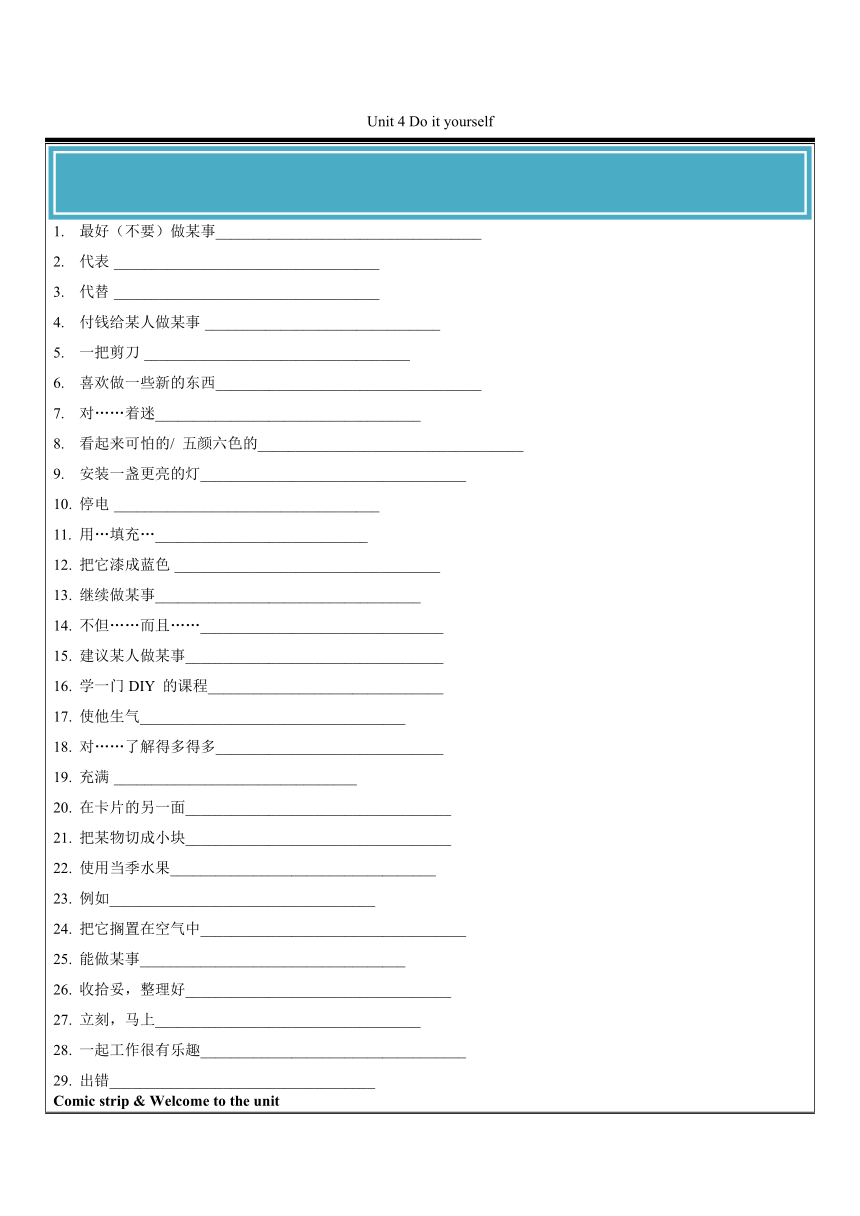 | |
| 格式 | docx | ||
| 文件大小 | 174.2KB | ||
| 资源类型 | 教案 | ||
| 版本资源 | 牛津译林版 | ||
| 科目 | 英语 | ||
| 更新时间 | 2024-09-05 15:02:38 | ||
图片预览

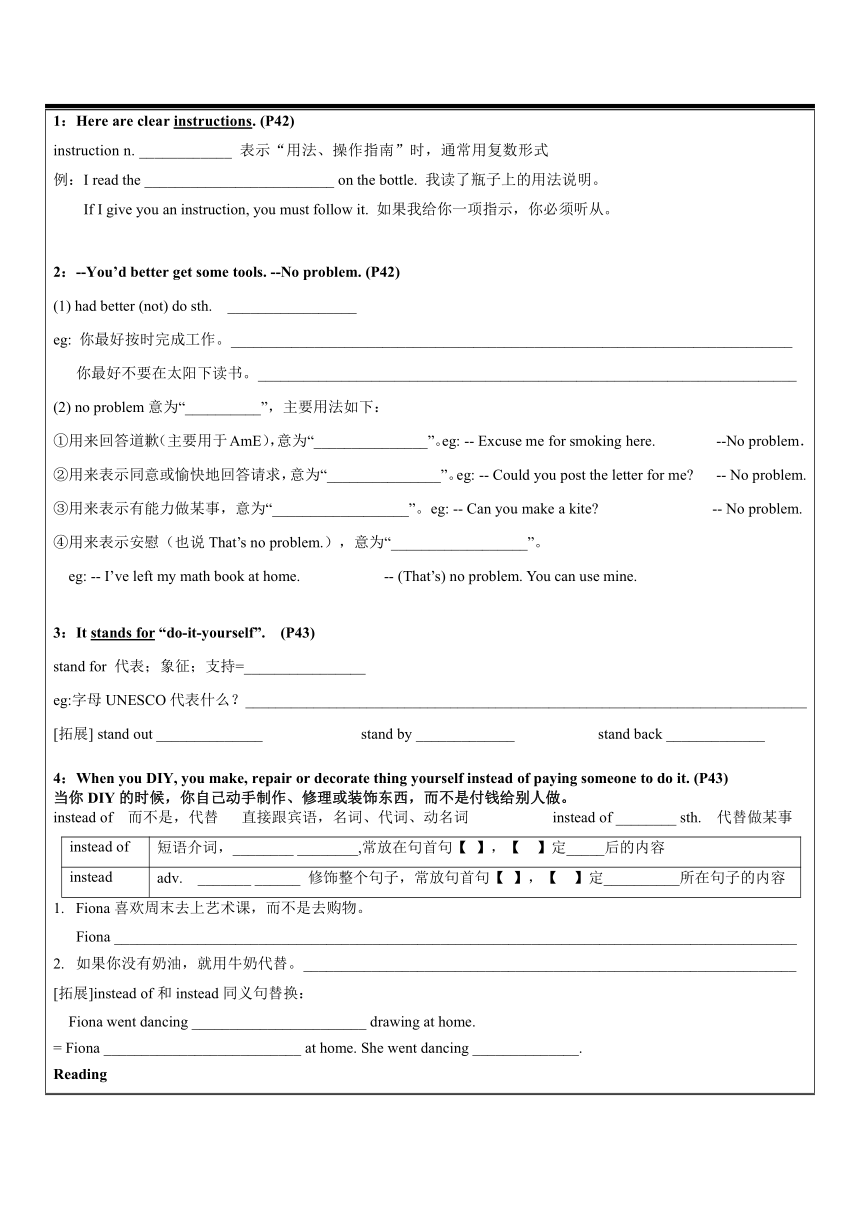
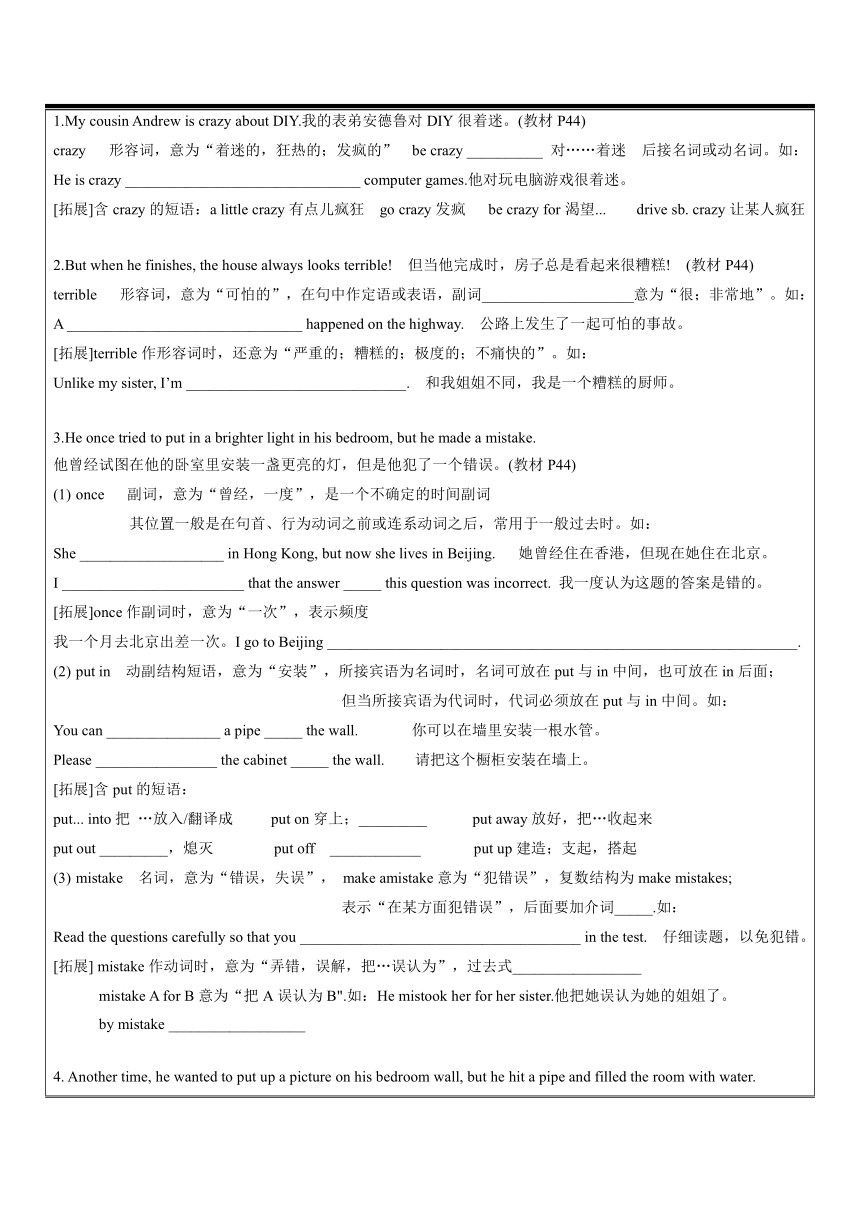
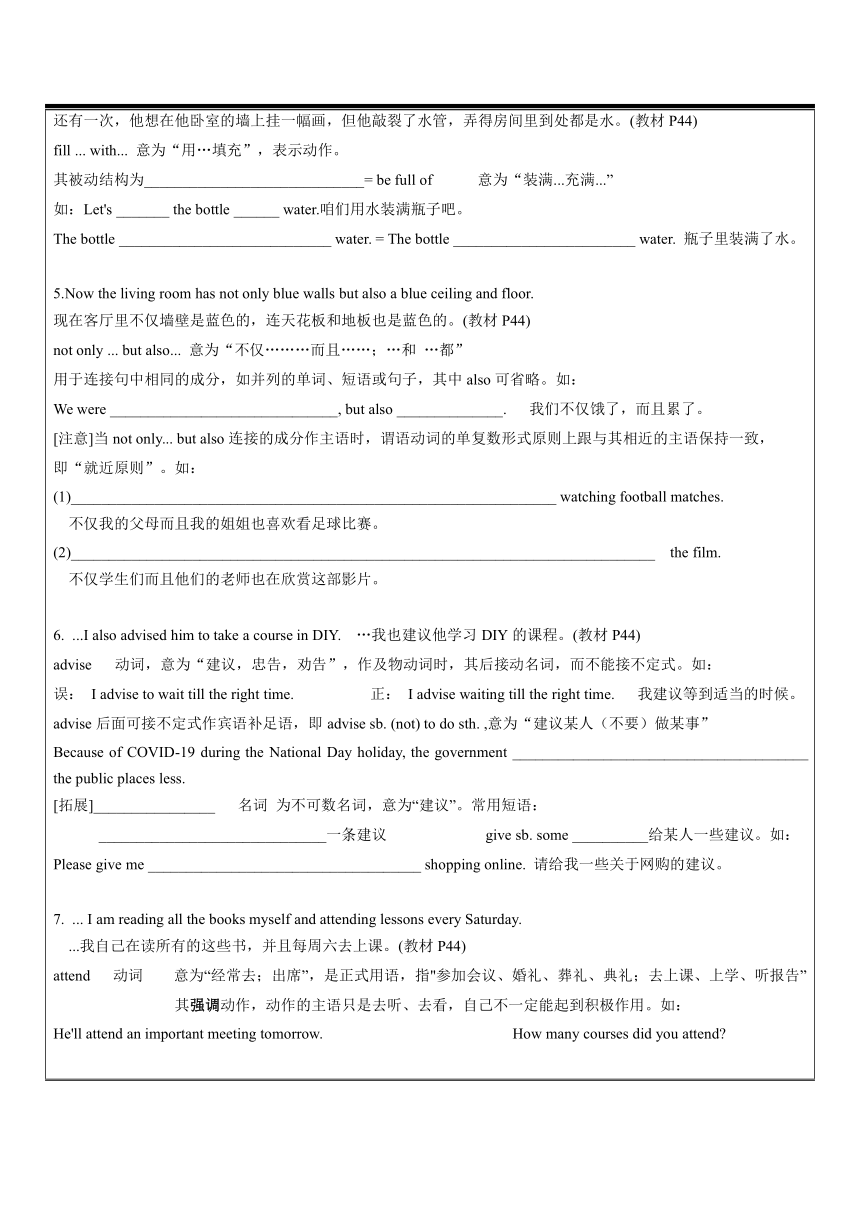
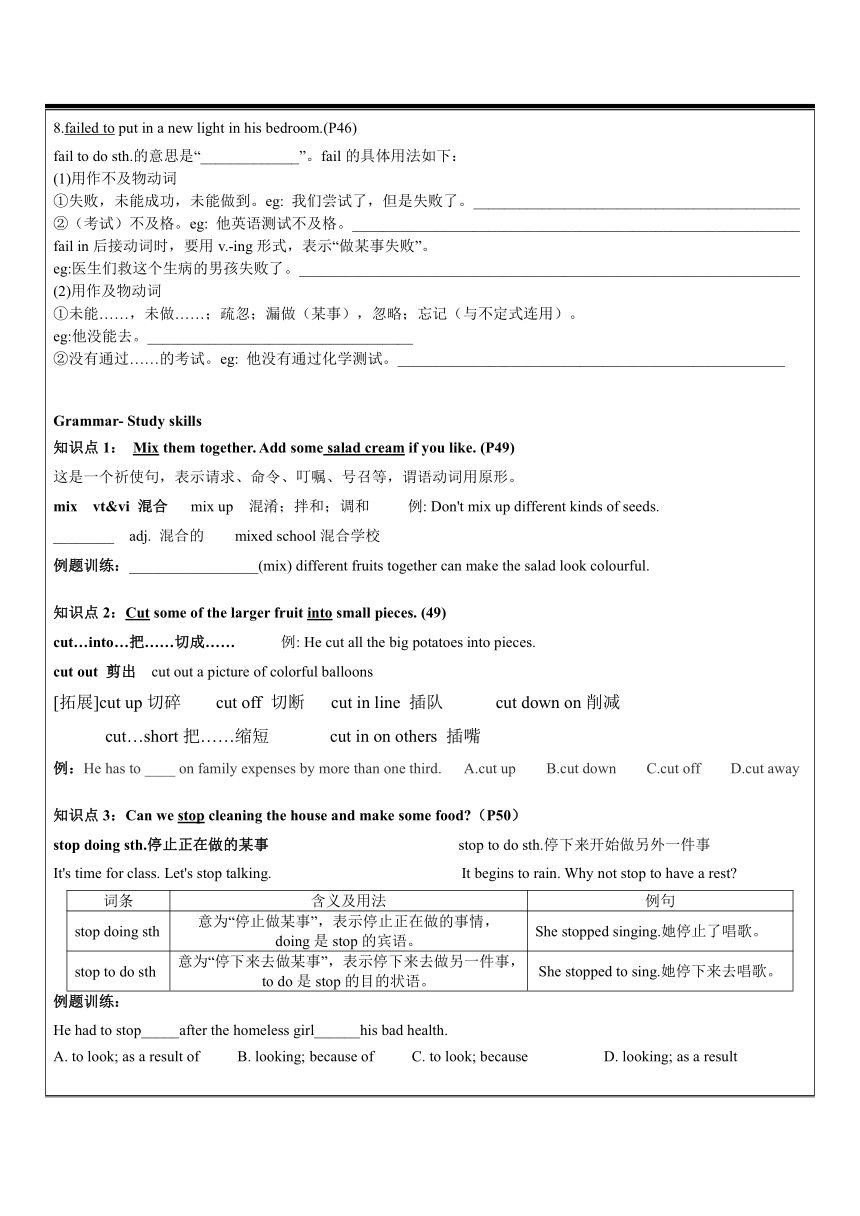
文档简介
Unit 4 Do it yourself
最好(不要)做某事___________________________________ 代表 ___________________________________ 代替 ___________________________________ 付钱给某人做某事 _______________________________ 一把剪刀 ___________________________________ 喜欢做一些新的东西___________________________________ 对……着迷___________________________________ 看起来可怕的/ 五颜六色的___________________________________ 安装一盏更亮的灯___________________________________ 停电 ___________________________________ 用…填充…____________________________ 把它漆成蓝色 ___________________________________ 继续做某事___________________________________ 不但……而且……________________________________ 建议某人做某事__________________________________ 学一门DIY 的课程_______________________________ 使他生气___________________________________ 对……了解得多得多______________________________ 充满 ________________________________ 在卡片的另一面___________________________________ 把某物切成小块___________________________________ 使用当季水果___________________________________ 例如___________________________________ 把它搁置在空气中___________________________________ 能做某事___________________________________ 收拾妥,整理好___________________________________ 立刻,马上___________________________________ 一起工作很有乐趣___________________________________ 出错___________________________________ Comic strip & Welcome to the unit 1:Here are clear instructions. (P42) instruction n. ____________ 表示“用法、操作指南”时,通常用复数形式 例:I read the _________________________ on the bottle. 我读了瓶子上的用法说明。 If I give you an instruction, you must follow it. 如果我给你一项指示,你必须听从。 2:--You’d better get some tools. --No problem. (P42) (1) had better (not) do sth. _________________ eg: 你最好按时完成工作。__________________________________________________________________________ 你最好不要在太阳下读书。_______________________________________________________________________ (2) no problem意为“__________”,主要用法如下: ①用来回答道歉(主要用于AmE),意为“_______________”。eg: -- Excuse me for smoking here. --No problem. ②用来表示同意或愉快地回答请求,意为“_______________”。eg: -- Could you post the letter for me -- No problem. ③用来表示有能力做某事,意为“__________________”。eg: -- Can you make a kite -- No problem. ④用来表示安慰(也说That’s no problem.),意为“__________________”。 eg: -- I’ve left my math book at home. -- (That’s) no problem. You can use mine. 3:It stands for “do-it-yourself”. (P43) stand for 代表;象征;支持=________________ eg:字母UNESCO代表什么?__________________________________________________________________________ [拓展] stand out ______________ stand by _____________ stand back _____________ 4:When you DIY, you make, repair or decorate thing yourself instead of paying someone to do it. (P43) 当你DIY的时候,你自己动手制作、修理或装饰东西,而不是付钱给别人做。 instead of 而不是,代替 直接跟宾语,名词、代词、动名词 instead of ________ sth. 代替做某事 instead of短语介词,________ ________,常放在句首句【 】,【 】定_____后的内容insteadadv. _______ ______ 修饰整个句子,常放句首句【 】,【 】定__________所在句子的内容
Fiona喜欢周末去上艺术课,而不是去购物。 Fiona __________________________________________________________________________________________ 如果你没有奶油,就用牛奶代替。_________________________________________________________________ [拓展]instead of和instead同义句替换: Fiona went dancing _______________________ drawing at home. = Fiona __________________________ at home. She went dancing ______________. Reading 1.My cousin Andrew is crazy about DIY.我的表弟安德鲁对DIY很着迷。(教材P44) crazy 形容词,意为“着迷的,狂热的;发疯的” be crazy __________ 对……着迷 后接名词或动名词。如: He is crazy _______________________________ computer games.他对玩电脑游戏很着迷。 [拓展]含crazy的短语:a little crazy有点儿疯狂 go crazy发疯 be crazy for渴望... drive sb. crazy让某人疯狂 2.But when he finishes, the house always looks terrible! 但当他完成时,房子总是看起来很糟糕! (教材P44) terrible 形容词,意为“可怕的”,在句中作定语或表语,副词____________________意为“很;非常地”。如: A _______________________________ happened on the highway. 公路上发生了一起可怕的事故。 [拓展]terrible作形容词时,还意为“严重的;糟糕的;极度的;不痛快的”。如: Unlike my sister, I’m _____________________________. 和我姐姐不同,我是一个糟糕的厨师。 3.He once tried to put in a brighter light in his bedroom, but he made a mistake. 他曾经试图在他的卧室里安装一盏更亮的灯,但是他犯了一个错误。(教材P44) once 副词,意为“曾经,一度”,是一个不确定的时间副词 其位置一般是在句首、行为动词之前或连系动词之后,常用于一般过去时。如: She ___________________ in Hong Kong, but now she lives in Beijing. 她曾经住在香港,但现在她住在北京。 I ________________________ that the answer _____ this question was incorrect. 我一度认为这题的答案是错的。 [拓展]once作副词时,意为“一次”,表示频度 我一个月去北京出差一次。I go to Beijing ______________________________________________________________. put in 动副结构短语,意为“安装”,所接宾语为名词时,名词可放在put与in中间,也可放在in后面; 但当所接宾语为代词时,代词必须放在put与in中间。如: You can _______________ a pipe _____ the wall. 你可以在墙里安装一根水管。 Please ________________ the cabinet _____ the wall. 请把这个橱柜安装在墙上。 [拓展]含put的短语: put... into把 …放入/翻译成 put on穿上;_________ put away放好,把…收起来 put out _________,熄灭 put off ____________ put up建造;支起,搭起 mistake 名词,意为“错误,失误”, make amistake意为“犯错误”,复数结构为make mistakes; 表示“在某方面犯错误”,后面要加介词_____.如: Read the questions carefully so that you _____________________________________ in the test. 仔细读题,以免犯错。[拓展] mistake作动词时,意为“弄错,误解,把…误认为”,过去式_________________ mistake A for B意为“把A误认为B".如:He mistook her for her sister.他把她误认为她的姐姐了。 by mistake __________________ 4. Another time, he wanted to put up a picture on his bedroom wall, but he hit a pipe and filled the room with water. 还有一次,他想在他卧室的墙上挂一幅画,但他敲裂了水管,弄得房间里到处都是水。(教材P44) fill ... with... 意为“用…填充”,表示动作。 其被动结构为_____________________________= be full of 意为“装满...充满...” 如:Let's _______ the bottle ______ water.咱们用水装满瓶子吧。 The bottle ____________________________ water. = The bottle ________________________ water. 瓶子里装满了水。 5.Now the living room has not only blue walls but also a blue ceiling and floor. 现在客厅里不仅墙壁是蓝色的,连天花板和地板也是蓝色的。(教材P44) not only ... but also... 意为“不仅………而且……;…和 …都” 用于连接句中相同的成分,如并列的单词、短语或句子,其中also可省略。如: We were ______________________________, but also ______________. 我们不仅饿了,而且累了。 [注意]当not only... but also连接的成分作主语时,谓语动词的单复数形式原则上跟与其相近的主语保持一致, 即“就近原则”。如: (1)________________________________________________________________ watching football matches. 不仅我的父母而且我的姐姐也喜欢看足球比赛。 (2)_____________________________________________________________________________ the film. 不仅学生们而且他们的老师也在欣赏这部影片。 ...I also advised him to take a course in DIY. …我也建议他学习DIY的课程。(教材P44) advise 动词,意为“建议,忠告,劝告”,作及物动词时,其后接动名词,而不能接不定式。如: 误: I advise to wait till the right time. 正: I advise waiting till the right time. 我建议等到适当的时候。 advise后面可接不定式作宾语补足语,即advise sb. (not) to do sth. ,意为“建议某人(不要)做某事” Because of COVID-19 during the National Day holiday, the government _______________________________________ the public places less. [拓展]________________ 名词 为不可数名词,意为“建议”。常用短语: ______________________________一条建议 give sb. some __________给某人一些建议。如: Please give me ____________________________________ shopping online. 请给我一些关于网购的建议。 ... I am reading all the books myself and attending lessons every Saturday. ...我自己在读所有的这些书,并且每周六去上课。(教材P44) attend 动词 意为“经常去;出席”,是正式用语,指"参加会议、婚礼、葬礼、典礼;去上课、上学、听报告” 其强调动作,动作的主语只是去听、去看,自己不一定能起到积极作用。如: He'll attend an important meeting tomorrow. How many courses did you attend 8.failed to put in a new light in his bedroom.(P46) fail to do sth.的意思是“_____________”。fail的具体用法如下: (1)用作不及物动词 ①失败,未能成功,未能做到。eg: 我们尝试了,但是失败了。___________________________________________ ②(考试)不及格。eg: 他英语测试不及格。___________________________________________________________ fail in后接动词时,要用v.-ing形式,表示“做某事失败”。 eg:医生们救这个生病的男孩失败了。__________________________________________________________________ (2)用作及物动词 ①未能……,未做……;疏忽;漏做(某事),忽略;忘记(与不定式连用)。 eg:他没能去。___________________________________ ②没有通过……的考试。eg: 他没有通过化学测试。___________________________________________________ Grammar- Study skills 知识点1: Mix them together. Add some salad cream if you like. (P49) 这是一个祈使句,表示请求、命令、叮嘱、号召等,谓语动词用原形。 mix vt&vi 混合 mix up 混淆;拌和;调和 例: Don't mix up different kinds of seeds. ________ adj. 混合的 mixed school混合学校 例题训练:_________________(mix) different fruits together can make the salad look colourful. 知识点2:Cut some of the larger fruit into small pieces. (49) cut…into…把……切成…… 例: He cut all the big potatoes into pieces. cut out 剪出 cut out a picture of colorful balloons [拓展]cut up切碎 cut off 切断 cut in line 插队 cut down on削减 cut…short把……缩短 cut in on others 插嘴 例:He has to ____ on family expenses by more than one third. A.cut up B.cut down C.cut off D.cut away 知识点3:Can we stop cleaning the house and make some food (P50) stop doing sth.停止正在做的某事 stop to do sth.停下来开始做另外一件事 It's time for class. Let's stop talking. It begins to rain. Why not stop to have a rest 词条含义及用法例句stop doing sth意为“停止做某事”,表示停止正在做的事情, doing是stop的宾语。She stopped singing.她停止了唱歌。stop to do sth意为“停下来去做某事”,表示停下来去做另一件事,to do是stop的目的状语。She stopped to sing.她停下来去唱歌。
例题训练: He had to stop_____after the homeless girl______his bad health. A. to look; as a result of B. looking; because of C. to look; because D. looking; as a result 知识点4:For example, mixing red apples… (P50) 用法辨析:for example与such as for example用于举例说明某种论点或情况,一般只列举同类人或事物中的【 】个; 作插入语时,可位于句首、句中或句末。 such as意为“诸如”,也用来列举事物,一般列举同类人或物中的【 】个, 插在被列举的事物与前面的名词之间,as后面不可用逗号隔开。 例题训练:There are many subjects in school, ________________, English.(例如) 知识点5:--Are you able to fix your bicycle, Andy --No. I’m uncertain that I can fix it myself. (P51) 1.fix v. 意思是“修理;固定”。 例: My bike is broken. It needs fixing. 2.uncertain adj. “不确定的”,是certain的反义词。 [拓展] un-是一个否定前缀,由它构成的词还有:uncomfortable, unimportant , uninteresting等。 [搭配] 例题训练: It’s ___________(certain) that the problem of air pollution can be solved. We still work on it to find a way out. 知识点6:It's possible to sleep with all that noise.(P51) It is+形容词+to do sth。 句首的it在句中充当形式主语,真正的主语是句中的动词不定式to sleep with all that noise。 例:It is possible to get there by bus.可以乘公共汽车到那里。 It is impossible to draw a horse within five minutes. (2)as…as possible意为“尽可能地……”。 例:You must make your body as strong as possible. (3)句中的形容词possible意为“可能的”,其反义词 impossible,意为“不可能的”。 [拓展] 形容词前加前缀im-, in-,也可以表示相反的意思。如: polite礼貌的--impolite不礼貌的 correct正确的--incorrect不正确的 patient耐心的--impatient不耐心的 active积极的--inactive不积极的 complete完成的--incomplete完成的 direct直接的--indirect间接的 例题训练:His laziness makes it ____________________ (possible) for him to pass the exam. 知识点7:I'll tidy up right now.(P51) tidy up的意思是“收拾妥,整理好” = put away tidy up是“动词+副词”短语,当代词作宾语时,必须放在动词和副词中间。 tidy 形容词,意为“整洁的”。反义词为___tidy,意为“不整洁的”;untidy的近义词为dirty,意为“脏的”。 例: Please tidy up the room after the party. right now意思是“现在,马上” 例: Let's go home right now. 例题训练:你确定你能自己把你的房间收拾好吗 Are you __________/__________ you can ______________ your room ____________________/ ___________________ Task 1.Mum’s birthday is coming, so I decided to make her a birthday card by myself. (P52) 1.decide to do sth. 决定做某事 = make a decision to do sth.=make up one’s mind to do sth 例:Tom and his parents decided to go for a holiday this weekend. Lillian决定出国深造。Lillian _______________________________________________________________________ 2.make sb sth 给某人制作某物 = make sth _____ sb 例: The children made some presents for their teachers on the Teachers’ Day. 3.by oneself 自己,独自=alone=on one’s own 例: The little girl goes home by herself after school. 2....I wanted to keep it secret. ...我想保密。(教材P52) keep it secret意为“保密“,为“keep + sth. adj."结构,表示“使某物……“。 secret ______ 意为“秘密的”。如: Tom tried to ________________________ from his family. 汤姆试图把这件事对他家人保密。 He is secret about his past. 他对他的过去守口如瓶。 3. Lots of things went wrong during that time. 在那期间许多事情出了错。(教材P52) go wrong意为“弄错;犯错;(机器)出故障”,其中wrong为副词,意为“错误地,不对”。如: My watch keeps going wrong.我的手表不断地出毛病。 You can learn a lot If you understand what went wrong. 如果你理解什么出了问题,你就能学到很多。 [拓展]wrong __________ 意为“不正确的,错误的;有毛病的”,反义词为__________ 意为“正确的”。如: I think your answer is wrong. 我认为你的答案不正确。 4. When I completed the card, there was paint on everything: the table, Sandy's books, my clothes, my hands and face! 当我完成这张卡片时,每件东西上都有了颜料:桌子、桑迪的书、我的衣服、我的手和脸! (教材P52) complete v. 意为“完成”,后面直接跟宾语。如: We should complete the work quickly. 我们应该迅速完成工作。 complete后面不能接动词,但其同义词finish可构成固定结构finish doing sth. ,意为“完成做某事”。如: Let's finish drawing the picture. 咱们画完这幅画吧。 [拓展]complete还可作形容词,意为“完全的;已完成的”,副词形式_________________ 意为“完全,彻底” 如: My homework is complete.我的家庭作业完成了。 Grammar 语法 一、祈使句 定义:祈使句表示________、________、_______、_______、提醒、叮嘱、号召等。 谓语动词用【 】 否定形式在句首加_____________。 (2)类型: 1)行为动词类型:Open the door,please!请把门打开! Don't open the door,please!请不要开门! 2)以let开头的祈使句:Let me go there.让我去那儿吧。 3)“Be+形容词”类型:Be careful! 小心! 4)“No+名词/动名词”类型:No smoking! 禁止吸烟! (3)注意:祈使句的反义疑问句的简略疑问句,一般用____________ 但是Let’s….句型后加_____________ 二、用should和had better提建议 should和had better都是情态动词,都可以用于给他人提建议,表示“应该”或“最好”做某事。 1.should表“建议” (1)should意为“应该”,后跟动词原形,没有人称和数的变化,由时间状语或上下文来决定现在、过去或将来。如: You should do your homework more carefully. He should be back in three days. should的否定形式是should not或shouldn’t;疑问式是将should提到句子开头; 反意疑问部分应为“should/shouldn’t+主语”。如: You shouldn’t come here alone again. You shouldn’t make noise in class,should you --- Should we discuss it at once 我们应该马上讨论它吗 ---Yes,you should.是的,你们应该。 2.had better表“建议” (1)had better可缩写为’d better,后跟动词原形,表示现在或将来,没有人称和数的变化。如: You’d better clean your room every day.你最好每天都打扫房间。 had better的否定形式是had better not;疑问式是将had放在主语之前; 在反意疑问句中,反意疑问部分用“had/hadn’t+主语”。如: We’d better not stay at home. You’d better come to see me,hadn’t you 你最好来看我,好吗 [总结]表示提建议的句型有: (1) Would you like/love (to do) sth. 这是一个很委婉的表示建议的句型,并带有与对方商量的意味,意为“你想要(做)……吗?”。 (2) Shall I/we do sth.? 此句型是用来提建议或征求对方意见的,意为“我(们)做……好吗?”,语气委婉,商量的语气较浓。 (3) Let's do sth. 当你觉得可以直截了当地向对方提出建议,让对方和自己一起去做某事时,常用该句型,意为“咱们做……吧。”该句型后常加附加问句“shall we ”,使语气更加委婉。 (4) 主语+had better (not) do sth.. 该句型用于表示对下级、晚辈的劝告,往往带有命令、强制的语气,意为“某人最好(不要)做某事”。 Why don't you/we do sth.?向对方提出建议或询问某种原因,暗含有责备对方的意思,意为“为什么不……?” (6) What/How about (doing) sth. 如果是在讨论式的谈话中,可用该句型提出一个建议或引出一个新话题。 (7) You should (not) do..., 此句型意为“你(不)应该做……”。should的语气比had better要委婉。 1、 down the radio. The baby’s sleeping in the next room. A.Turning B.To turn C.Turn D.Turned 2、Let’s football in the street. A.not to play B.not play C.don’t play D.not playing 3、 careful when you cross the street. A.Don’t be B.Do be C.Being D.Do 4、 the child all day long! A.Let, not to cry B.Not let, cry C.Don’t let, to cry D.Don’t let, cry 5、 afraid of make mistakes! A.Don’t be B.Not to be C.Not being D.Be not 6、 me again before coming. A.Calling B.To call C.Do calling D.Call 7、 --- In all the competitions, as in life, you _______ not always win. ---You are right. A. may B. shall C. must D. need 任务型 We live in a world full of many different kinds of people. We want to get along well with others. We also want to be liked by others, The following ways will make others like you. Do This and You’ll Be Welcome Anywhere Become really interested in other people. A show of interest must be true. It must bring good results to the person showing the interest, but also to the person receiving the attention. It is a two-way street—both of you get an advantage. A Simple Way to Make a Good First Impression (印象) Smile as often as possible. Your smile is a sign of kindness. When someone feels stressed from his or her teachers or parents, your smile is like the sun breaking through the clouds, your smile can help him or her think that all is hopeful—that there is still joy in the world. If You Don’t Do This, You Are Getting into Trouble Remember a person’s name. A person’s name is the sweetest and the most important sound in any language. We should realize the magic in a name. The name makes the person different from others; it makes him or her special among all others. If you remember a person’s name, the relationship between both of you will become much closer. An Easy Way to Become a Good Talker Be a careful listener first. Ask questions that other persons will like to answer. Encourage(鼓励) them to talk about themselves and their achievements(成绩,成就). What you need to do is just to listen, because people are much more interested in themselves. Title: 1 to make people like youBecome really 2 in others●Your show of interest must be true. ●It must 3 good results to both of you.Smile as often as possible●Your smile is a sign of 4 . ●Your smile makes others 5 that all is hopeful. Remember a person’s name●A person’s name makes him or her 6 from others. ●A person’s name is the sweetest and the most important sound in any 7 .Listen 8 first●You ask questions that others enjoy 9 . ●They are encouraged to talk about 10 and their achievements.
1._____________ 2._____________ 3._____________ 4._____________ 5._____________ 6._____________ 7._____________ 8. _____________9. _____________ 10._____________ 首字母填空 Learning English is not an easy job. Almost every student sometimes a 1 questions like these: Can I really learn English well Can I really learn it well enough to t 2 with others The answer is yes. From some studies we know that almost a 3 can learn a foreign language well if he or she wants to. Some might learn it faster and some might learn it slower. Some might learn it e 4 and some with difficulty. But anyone can learn it well if he or she has the c 5 ways. Many students have their own special ways in learning English. The followings are some e 6 . Millie gets up early every morning and the first thing she does is listen to an English radio program. This has really helped make her English in listening b 7 . Daniel often p 8 speaking English in class. At first he was nervous when he was asked to speak. After trying several times, he found it was not as d 9 as he thought. He is more active and now he speaks English best among his classmates. Jim likes to watch American movies. He will watch it many times i 10 it is a good a good film. And he also likes to read English aloud. 1._____________ 2._____________ 3._____________ 4._____________ 5._____________ 6._____________ 7._____________ 8. _____________9. _____________ 10._____________ 错题订正:__________________________________________________________________________________________ __________________________________________________________________________________________________ 生词积累:__________________________________________________________________________________________ __________________________________________________________________________________________________ __________________________________________________________________________________________________ 固定搭配:__________________________________________________________________________________________ ___________________________________________________________________________________________________ 好词好句:__________________________________________________________________________________________ ___________________________________________________________________________________________________
最好(不要)做某事___________________________________ 代表 ___________________________________ 代替 ___________________________________ 付钱给某人做某事 _______________________________ 一把剪刀 ___________________________________ 喜欢做一些新的东西___________________________________ 对……着迷___________________________________ 看起来可怕的/ 五颜六色的___________________________________ 安装一盏更亮的灯___________________________________ 停电 ___________________________________ 用…填充…____________________________ 把它漆成蓝色 ___________________________________ 继续做某事___________________________________ 不但……而且……________________________________ 建议某人做某事__________________________________ 学一门DIY 的课程_______________________________ 使他生气___________________________________ 对……了解得多得多______________________________ 充满 ________________________________ 在卡片的另一面___________________________________ 把某物切成小块___________________________________ 使用当季水果___________________________________ 例如___________________________________ 把它搁置在空气中___________________________________ 能做某事___________________________________ 收拾妥,整理好___________________________________ 立刻,马上___________________________________ 一起工作很有乐趣___________________________________ 出错___________________________________ Comic strip & Welcome to the unit 1:Here are clear instructions. (P42) instruction n. ____________ 表示“用法、操作指南”时,通常用复数形式 例:I read the _________________________ on the bottle. 我读了瓶子上的用法说明。 If I give you an instruction, you must follow it. 如果我给你一项指示,你必须听从。 2:--You’d better get some tools. --No problem. (P42) (1) had better (not) do sth. _________________ eg: 你最好按时完成工作。__________________________________________________________________________ 你最好不要在太阳下读书。_______________________________________________________________________ (2) no problem意为“__________”,主要用法如下: ①用来回答道歉(主要用于AmE),意为“_______________”。eg: -- Excuse me for smoking here. --No problem. ②用来表示同意或愉快地回答请求,意为“_______________”。eg: -- Could you post the letter for me -- No problem. ③用来表示有能力做某事,意为“__________________”。eg: -- Can you make a kite -- No problem. ④用来表示安慰(也说That’s no problem.),意为“__________________”。 eg: -- I’ve left my math book at home. -- (That’s) no problem. You can use mine. 3:It stands for “do-it-yourself”. (P43) stand for 代表;象征;支持=________________ eg:字母UNESCO代表什么?__________________________________________________________________________ [拓展] stand out ______________ stand by _____________ stand back _____________ 4:When you DIY, you make, repair or decorate thing yourself instead of paying someone to do it. (P43) 当你DIY的时候,你自己动手制作、修理或装饰东西,而不是付钱给别人做。 instead of 而不是,代替 直接跟宾语,名词、代词、动名词 instead of ________ sth. 代替做某事 instead of短语介词,________ ________,常放在句首句【 】,【 】定_____后的内容insteadadv. _______ ______ 修饰整个句子,常放句首句【 】,【 】定__________所在句子的内容
Fiona喜欢周末去上艺术课,而不是去购物。 Fiona __________________________________________________________________________________________ 如果你没有奶油,就用牛奶代替。_________________________________________________________________ [拓展]instead of和instead同义句替换: Fiona went dancing _______________________ drawing at home. = Fiona __________________________ at home. She went dancing ______________. Reading 1.My cousin Andrew is crazy about DIY.我的表弟安德鲁对DIY很着迷。(教材P44) crazy 形容词,意为“着迷的,狂热的;发疯的” be crazy __________ 对……着迷 后接名词或动名词。如: He is crazy _______________________________ computer games.他对玩电脑游戏很着迷。 [拓展]含crazy的短语:a little crazy有点儿疯狂 go crazy发疯 be crazy for渴望... drive sb. crazy让某人疯狂 2.But when he finishes, the house always looks terrible! 但当他完成时,房子总是看起来很糟糕! (教材P44) terrible 形容词,意为“可怕的”,在句中作定语或表语,副词____________________意为“很;非常地”。如: A _______________________________ happened on the highway. 公路上发生了一起可怕的事故。 [拓展]terrible作形容词时,还意为“严重的;糟糕的;极度的;不痛快的”。如: Unlike my sister, I’m _____________________________. 和我姐姐不同,我是一个糟糕的厨师。 3.He once tried to put in a brighter light in his bedroom, but he made a mistake. 他曾经试图在他的卧室里安装一盏更亮的灯,但是他犯了一个错误。(教材P44) once 副词,意为“曾经,一度”,是一个不确定的时间副词 其位置一般是在句首、行为动词之前或连系动词之后,常用于一般过去时。如: She ___________________ in Hong Kong, but now she lives in Beijing. 她曾经住在香港,但现在她住在北京。 I ________________________ that the answer _____ this question was incorrect. 我一度认为这题的答案是错的。 [拓展]once作副词时,意为“一次”,表示频度 我一个月去北京出差一次。I go to Beijing ______________________________________________________________. put in 动副结构短语,意为“安装”,所接宾语为名词时,名词可放在put与in中间,也可放在in后面; 但当所接宾语为代词时,代词必须放在put与in中间。如: You can _______________ a pipe _____ the wall. 你可以在墙里安装一根水管。 Please ________________ the cabinet _____ the wall. 请把这个橱柜安装在墙上。 [拓展]含put的短语: put... into把 …放入/翻译成 put on穿上;_________ put away放好,把…收起来 put out _________,熄灭 put off ____________ put up建造;支起,搭起 mistake 名词,意为“错误,失误”, make amistake意为“犯错误”,复数结构为make mistakes; 表示“在某方面犯错误”,后面要加介词_____.如: Read the questions carefully so that you _____________________________________ in the test. 仔细读题,以免犯错。[拓展] mistake作动词时,意为“弄错,误解,把…误认为”,过去式_________________ mistake A for B意为“把A误认为B".如:He mistook her for her sister.他把她误认为她的姐姐了。 by mistake __________________ 4. Another time, he wanted to put up a picture on his bedroom wall, but he hit a pipe and filled the room with water. 还有一次,他想在他卧室的墙上挂一幅画,但他敲裂了水管,弄得房间里到处都是水。(教材P44) fill ... with... 意为“用…填充”,表示动作。 其被动结构为_____________________________= be full of 意为“装满...充满...” 如:Let's _______ the bottle ______ water.咱们用水装满瓶子吧。 The bottle ____________________________ water. = The bottle ________________________ water. 瓶子里装满了水。 5.Now the living room has not only blue walls but also a blue ceiling and floor. 现在客厅里不仅墙壁是蓝色的,连天花板和地板也是蓝色的。(教材P44) not only ... but also... 意为“不仅………而且……;…和 …都” 用于连接句中相同的成分,如并列的单词、短语或句子,其中also可省略。如: We were ______________________________, but also ______________. 我们不仅饿了,而且累了。 [注意]当not only... but also连接的成分作主语时,谓语动词的单复数形式原则上跟与其相近的主语保持一致, 即“就近原则”。如: (1)________________________________________________________________ watching football matches. 不仅我的父母而且我的姐姐也喜欢看足球比赛。 (2)_____________________________________________________________________________ the film. 不仅学生们而且他们的老师也在欣赏这部影片。 ...I also advised him to take a course in DIY. …我也建议他学习DIY的课程。(教材P44) advise 动词,意为“建议,忠告,劝告”,作及物动词时,其后接动名词,而不能接不定式。如: 误: I advise to wait till the right time. 正: I advise waiting till the right time. 我建议等到适当的时候。 advise后面可接不定式作宾语补足语,即advise sb. (not) to do sth. ,意为“建议某人(不要)做某事” Because of COVID-19 during the National Day holiday, the government _______________________________________ the public places less. [拓展]________________ 名词 为不可数名词,意为“建议”。常用短语: ______________________________一条建议 give sb. some __________给某人一些建议。如: Please give me ____________________________________ shopping online. 请给我一些关于网购的建议。 ... I am reading all the books myself and attending lessons every Saturday. ...我自己在读所有的这些书,并且每周六去上课。(教材P44) attend 动词 意为“经常去;出席”,是正式用语,指"参加会议、婚礼、葬礼、典礼;去上课、上学、听报告” 其强调动作,动作的主语只是去听、去看,自己不一定能起到积极作用。如: He'll attend an important meeting tomorrow. How many courses did you attend 8.failed to put in a new light in his bedroom.(P46) fail to do sth.的意思是“_____________”。fail的具体用法如下: (1)用作不及物动词 ①失败,未能成功,未能做到。eg: 我们尝试了,但是失败了。___________________________________________ ②(考试)不及格。eg: 他英语测试不及格。___________________________________________________________ fail in后接动词时,要用v.-ing形式,表示“做某事失败”。 eg:医生们救这个生病的男孩失败了。__________________________________________________________________ (2)用作及物动词 ①未能……,未做……;疏忽;漏做(某事),忽略;忘记(与不定式连用)。 eg:他没能去。___________________________________ ②没有通过……的考试。eg: 他没有通过化学测试。___________________________________________________ Grammar- Study skills 知识点1: Mix them together. Add some salad cream if you like. (P49) 这是一个祈使句,表示请求、命令、叮嘱、号召等,谓语动词用原形。 mix vt&vi 混合 mix up 混淆;拌和;调和 例: Don't mix up different kinds of seeds. ________ adj. 混合的 mixed school混合学校 例题训练:_________________(mix) different fruits together can make the salad look colourful. 知识点2:Cut some of the larger fruit into small pieces. (49) cut…into…把……切成…… 例: He cut all the big potatoes into pieces. cut out 剪出 cut out a picture of colorful balloons [拓展]cut up切碎 cut off 切断 cut in line 插队 cut down on削减 cut…short把……缩短 cut in on others 插嘴 例:He has to ____ on family expenses by more than one third. A.cut up B.cut down C.cut off D.cut away 知识点3:Can we stop cleaning the house and make some food (P50) stop doing sth.停止正在做的某事 stop to do sth.停下来开始做另外一件事 It's time for class. Let's stop talking. It begins to rain. Why not stop to have a rest 词条含义及用法例句stop doing sth意为“停止做某事”,表示停止正在做的事情, doing是stop的宾语。She stopped singing.她停止了唱歌。stop to do sth意为“停下来去做某事”,表示停下来去做另一件事,to do是stop的目的状语。She stopped to sing.她停下来去唱歌。
例题训练: He had to stop_____after the homeless girl______his bad health. A. to look; as a result of B. looking; because of C. to look; because D. looking; as a result 知识点4:For example, mixing red apples… (P50) 用法辨析:for example与such as for example用于举例说明某种论点或情况,一般只列举同类人或事物中的【 】个; 作插入语时,可位于句首、句中或句末。 such as意为“诸如”,也用来列举事物,一般列举同类人或物中的【 】个, 插在被列举的事物与前面的名词之间,as后面不可用逗号隔开。 例题训练:There are many subjects in school, ________________, English.(例如) 知识点5:--Are you able to fix your bicycle, Andy --No. I’m uncertain that I can fix it myself. (P51) 1.fix v. 意思是“修理;固定”。 例: My bike is broken. It needs fixing. 2.uncertain adj. “不确定的”,是certain的反义词。 [拓展] un-是一个否定前缀,由它构成的词还有:uncomfortable, unimportant , uninteresting等。 [搭配] 例题训练: It’s ___________(certain) that the problem of air pollution can be solved. We still work on it to find a way out. 知识点6:It's possible to sleep with all that noise.(P51) It is+形容词+to do sth。 句首的it在句中充当形式主语,真正的主语是句中的动词不定式to sleep with all that noise。 例:It is possible to get there by bus.可以乘公共汽车到那里。 It is impossible to draw a horse within five minutes. (2)as…as possible意为“尽可能地……”。 例:You must make your body as strong as possible. (3)句中的形容词possible意为“可能的”,其反义词 impossible,意为“不可能的”。 [拓展] 形容词前加前缀im-, in-,也可以表示相反的意思。如: polite礼貌的--impolite不礼貌的 correct正确的--incorrect不正确的 patient耐心的--impatient不耐心的 active积极的--inactive不积极的 complete完成的--incomplete完成的 direct直接的--indirect间接的 例题训练:His laziness makes it ____________________ (possible) for him to pass the exam. 知识点7:I'll tidy up right now.(P51) tidy up的意思是“收拾妥,整理好” = put away tidy up是“动词+副词”短语,当代词作宾语时,必须放在动词和副词中间。 tidy 形容词,意为“整洁的”。反义词为___tidy,意为“不整洁的”;untidy的近义词为dirty,意为“脏的”。 例: Please tidy up the room after the party. right now意思是“现在,马上” 例: Let's go home right now. 例题训练:你确定你能自己把你的房间收拾好吗 Are you __________/__________ you can ______________ your room ____________________/ ___________________ Task 1.Mum’s birthday is coming, so I decided to make her a birthday card by myself. (P52) 1.decide to do sth. 决定做某事 = make a decision to do sth.=make up one’s mind to do sth 例:Tom and his parents decided to go for a holiday this weekend. Lillian决定出国深造。Lillian _______________________________________________________________________ 2.make sb sth 给某人制作某物 = make sth _____ sb 例: The children made some presents for their teachers on the Teachers’ Day. 3.by oneself 自己,独自=alone=on one’s own 例: The little girl goes home by herself after school. 2....I wanted to keep it secret. ...我想保密。(教材P52) keep it secret意为“保密“,为“keep + sth. adj."结构,表示“使某物……“。 secret ______ 意为“秘密的”。如: Tom tried to ________________________ from his family. 汤姆试图把这件事对他家人保密。 He is secret about his past. 他对他的过去守口如瓶。 3. Lots of things went wrong during that time. 在那期间许多事情出了错。(教材P52) go wrong意为“弄错;犯错;(机器)出故障”,其中wrong为副词,意为“错误地,不对”。如: My watch keeps going wrong.我的手表不断地出毛病。 You can learn a lot If you understand what went wrong. 如果你理解什么出了问题,你就能学到很多。 [拓展]wrong __________ 意为“不正确的,错误的;有毛病的”,反义词为__________ 意为“正确的”。如: I think your answer is wrong. 我认为你的答案不正确。 4. When I completed the card, there was paint on everything: the table, Sandy's books, my clothes, my hands and face! 当我完成这张卡片时,每件东西上都有了颜料:桌子、桑迪的书、我的衣服、我的手和脸! (教材P52) complete v. 意为“完成”,后面直接跟宾语。如: We should complete the work quickly. 我们应该迅速完成工作。 complete后面不能接动词,但其同义词finish可构成固定结构finish doing sth. ,意为“完成做某事”。如: Let's finish drawing the picture. 咱们画完这幅画吧。 [拓展]complete还可作形容词,意为“完全的;已完成的”,副词形式_________________ 意为“完全,彻底” 如: My homework is complete.我的家庭作业完成了。 Grammar 语法 一、祈使句 定义:祈使句表示________、________、_______、_______、提醒、叮嘱、号召等。 谓语动词用【 】 否定形式在句首加_____________。 (2)类型: 1)行为动词类型:Open the door,please!请把门打开! Don't open the door,please!请不要开门! 2)以let开头的祈使句:Let me go there.让我去那儿吧。 3)“Be+形容词”类型:Be careful! 小心! 4)“No+名词/动名词”类型:No smoking! 禁止吸烟! (3)注意:祈使句的反义疑问句的简略疑问句,一般用____________ 但是Let’s….句型后加_____________ 二、用should和had better提建议 should和had better都是情态动词,都可以用于给他人提建议,表示“应该”或“最好”做某事。 1.should表“建议” (1)should意为“应该”,后跟动词原形,没有人称和数的变化,由时间状语或上下文来决定现在、过去或将来。如: You should do your homework more carefully. He should be back in three days. should的否定形式是should not或shouldn’t;疑问式是将should提到句子开头; 反意疑问部分应为“should/shouldn’t+主语”。如: You shouldn’t come here alone again. You shouldn’t make noise in class,should you --- Should we discuss it at once 我们应该马上讨论它吗 ---Yes,you should.是的,你们应该。 2.had better表“建议” (1)had better可缩写为’d better,后跟动词原形,表示现在或将来,没有人称和数的变化。如: You’d better clean your room every day.你最好每天都打扫房间。 had better的否定形式是had better not;疑问式是将had放在主语之前; 在反意疑问句中,反意疑问部分用“had/hadn’t+主语”。如: We’d better not stay at home. You’d better come to see me,hadn’t you 你最好来看我,好吗 [总结]表示提建议的句型有: (1) Would you like/love (to do) sth. 这是一个很委婉的表示建议的句型,并带有与对方商量的意味,意为“你想要(做)……吗?”。 (2) Shall I/we do sth.? 此句型是用来提建议或征求对方意见的,意为“我(们)做……好吗?”,语气委婉,商量的语气较浓。 (3) Let's do sth. 当你觉得可以直截了当地向对方提出建议,让对方和自己一起去做某事时,常用该句型,意为“咱们做……吧。”该句型后常加附加问句“shall we ”,使语气更加委婉。 (4) 主语+had better (not) do sth.. 该句型用于表示对下级、晚辈的劝告,往往带有命令、强制的语气,意为“某人最好(不要)做某事”。 Why don't you/we do sth.?向对方提出建议或询问某种原因,暗含有责备对方的意思,意为“为什么不……?” (6) What/How about (doing) sth. 如果是在讨论式的谈话中,可用该句型提出一个建议或引出一个新话题。 (7) You should (not) do..., 此句型意为“你(不)应该做……”。should的语气比had better要委婉。 1、 down the radio. The baby’s sleeping in the next room. A.Turning B.To turn C.Turn D.Turned 2、Let’s football in the street. A.not to play B.not play C.don’t play D.not playing 3、 careful when you cross the street. A.Don’t be B.Do be C.Being D.Do 4、 the child all day long! A.Let, not to cry B.Not let, cry C.Don’t let, to cry D.Don’t let, cry 5、 afraid of make mistakes! A.Don’t be B.Not to be C.Not being D.Be not 6、 me again before coming. A.Calling B.To call C.Do calling D.Call 7、 --- In all the competitions, as in life, you _______ not always win. ---You are right. A. may B. shall C. must D. need 任务型 We live in a world full of many different kinds of people. We want to get along well with others. We also want to be liked by others, The following ways will make others like you. Do This and You’ll Be Welcome Anywhere Become really interested in other people. A show of interest must be true. It must bring good results to the person showing the interest, but also to the person receiving the attention. It is a two-way street—both of you get an advantage. A Simple Way to Make a Good First Impression (印象) Smile as often as possible. Your smile is a sign of kindness. When someone feels stressed from his or her teachers or parents, your smile is like the sun breaking through the clouds, your smile can help him or her think that all is hopeful—that there is still joy in the world. If You Don’t Do This, You Are Getting into Trouble Remember a person’s name. A person’s name is the sweetest and the most important sound in any language. We should realize the magic in a name. The name makes the person different from others; it makes him or her special among all others. If you remember a person’s name, the relationship between both of you will become much closer. An Easy Way to Become a Good Talker Be a careful listener first. Ask questions that other persons will like to answer. Encourage(鼓励) them to talk about themselves and their achievements(成绩,成就). What you need to do is just to listen, because people are much more interested in themselves. Title: 1 to make people like youBecome really 2 in others●Your show of interest must be true. ●It must 3 good results to both of you.Smile as often as possible●Your smile is a sign of 4 . ●Your smile makes others 5 that all is hopeful. Remember a person’s name●A person’s name makes him or her 6 from others. ●A person’s name is the sweetest and the most important sound in any 7 .Listen 8 first●You ask questions that others enjoy 9 . ●They are encouraged to talk about 10 and their achievements.
1._____________ 2._____________ 3._____________ 4._____________ 5._____________ 6._____________ 7._____________ 8. _____________9. _____________ 10._____________ 首字母填空 Learning English is not an easy job. Almost every student sometimes a 1 questions like these: Can I really learn English well Can I really learn it well enough to t 2 with others The answer is yes. From some studies we know that almost a 3 can learn a foreign language well if he or she wants to. Some might learn it faster and some might learn it slower. Some might learn it e 4 and some with difficulty. But anyone can learn it well if he or she has the c 5 ways. Many students have their own special ways in learning English. The followings are some e 6 . Millie gets up early every morning and the first thing she does is listen to an English radio program. This has really helped make her English in listening b 7 . Daniel often p 8 speaking English in class. At first he was nervous when he was asked to speak. After trying several times, he found it was not as d 9 as he thought. He is more active and now he speaks English best among his classmates. Jim likes to watch American movies. He will watch it many times i 10 it is a good a good film. And he also likes to read English aloud. 1._____________ 2._____________ 3._____________ 4._____________ 5._____________ 6._____________ 7._____________ 8. _____________9. _____________ 10._____________ 错题订正:__________________________________________________________________________________________ __________________________________________________________________________________________________ 生词积累:__________________________________________________________________________________________ __________________________________________________________________________________________________ __________________________________________________________________________________________________ 固定搭配:__________________________________________________________________________________________ ___________________________________________________________________________________________________ 好词好句:__________________________________________________________________________________________ ___________________________________________________________________________________________________
